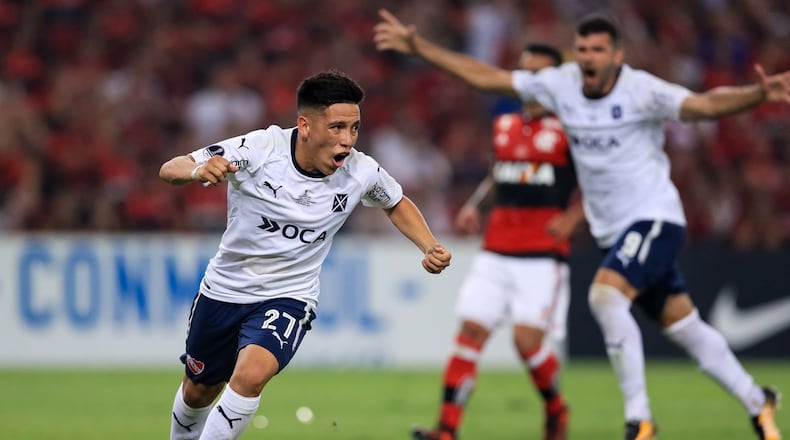The nice thing about being asked to participate in MLB Network’s “Atlanta Rules” – the documentary premiered Tuesday night – was that, for once, this correspondent wasn’t being asked about Atlanta Flops. (Although it’s true that those regal Braves of the ’90s won only one World Series. Maybe you’ve heard.) Much of this job, sad to say, has become the chronicling and collating of local failure. (Maybe you’ve heard about those, too.)
In some ways, the past few months have seen local entities clamber to great heights: The Falcons graced the Super Bowl, the Georgia Bulldogs a national championship game. Both held double-figure leads in the second half. Both lost in overtime. (Here I go again.) The Hawks? They’re tanking. The Braves? They tanked so hard their general manager got banned for life. Georgia Tech football? Just had its second losing season in three. College hoops? Don’t ask.
But there is, I submit, one local entity that, as English soccer announcers say, has yet to put a foot wrong. Fittingly enough, it’s a soccer team. I’m not sure how long it will take Atlanta United to go the way of all Atlanta teams and utterly disappoint us – but it hasn’t happened yet. If you’re looking for the Georgia entity doing the best business, even Kirby Smart and his star-spangled recruits run second to #ATLUTD. (Remember, the Bulldogs have been playing their brand of football rather longer than Atlanta’s MLS franchise.)
Atlanta United’s inaugural run was a smash in every way. Even if you assumed it would be good, it was way better. From the first sellout at borrowed Bobby Dodd Stadium to the record crowds at Mercedes-Benz, it was clear that this was the team of our city’s future. These weren’t the same fans who bought tickets to Braves/Falcons/Hawks/UGA/Tech. These were different – younger but somehow more passionate, sharp enough to have become attuned to the nuances of a game not new to our city but never offered in such an attractive package.
Better still, an expansion team never once looked the part. Atlanta United made a great coaching hire – Gerardo Martino, known worldwide as Tata, had previously bossed both Argentina and Barcelona – and went about its roster-building with purpose and dispatch. Darren Eales (president) and Carlos Bocanegra (technical director, which is soccer for GM) eschewed the fading-European-star route that many MLS teams have taken. They went younger and faster, loading up on South American talent. They finished second in goals to Toronto, which swept the regular-season title and the postseason MLS Cup.
Atlanta United made those playoffs, something no expansion team had done since 2009. They lost in Round 1 to the Columbus Crew, but that was in a shootout after 120 minutes that saw them unable to score. (It’s soccer. It happens.) Even that seemed kind of OK: Do you really want your first season to leave a team and its audience with no worlds to conquer?
This offseason – in soccer, there’s not much of one – has seen Atlanta United move from strength to strength. On Thursday, they’ll present Ezequiel Barco to the local media at their Marietta HQ. He’s 18. He’s from Argentina. He was bought from the Argentinian club Independiente for an MLS-record transfer fee of $15 million.
The time-honored route for promising South Americans is to head to Europe, where the big clubs with the big money are. The highest-ever Independiente sale saw Sergio Aguero leave for Atletico Madrid in 2009. (He’s now at Manchester City, runaway leaders of the English Premier League. He scored four goals against Leicester City on Saturday.) Barco’s arrival is a big deal not just for Atlanta United but for MLS, which has long chafed at its characterization as a poor relation to the European leagues.
Barco has been described as the New Messi, which is as much blessing as curse. (I remember when Javier Saviola of River Plate was the New Maradona.) Soccer is no different from any other sport: Not every gifted youngster grows into an all-timer. Still, it’s noteworthy that Atlanta United just sent Yamil Asad, a 24-year-old Argentinian who was terrific here last season, to D.C. United effectively clearing a spot for the teenager.
A team that fields an attacking foursome of Barco, Miguel Almiron, Hector Villalba and Josef Martinez – all from South America, the oldest being 24 – wouldn’t be laughed off any pitch in the world. As thrilling as this club was to watch last season, it should be even sleeker the second time around. And here I’m going to stop because, at the risk of divulging too much information, I’m winded.
I work in Atlanta. I’m unaccustomed to having only good things to say about anything. I need to have a lie-down and find a subject at which I can hurl the usual disparagement. It shouldn’t take long.
About the Author
The Latest
Featured



